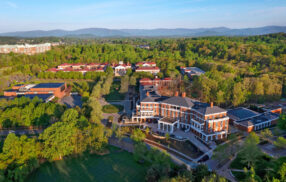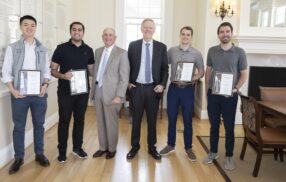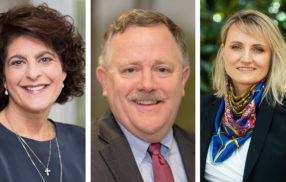How to Humanize Technology and Mitigate Bias in AI: Affectiva CEO at UVA Darden’s Leadership Unscripted
By Dave Hendrick
Bias in technology and artificial intelligence can appear in subtle, but damaging, ways.
Rana el Kaliouby, CEO of Affectiva, a company using artificial intelligence to detect emotion when humans interact through technology, recalled working with a luxury automaker who sent a data set for testing emotion-recognition software in automobiles made up exclusively of blond-haired, blue-eyed people.
El Kaliouby, speaking at a Leadership Unscripted event in conversation with University of Virginia Darden School of Business Professor Yael Grushka-Cockayne, said Affectiva politely sent the data set back to the client, reminding them “your drivers don’t all look like this.”
On the one hand, it was a small example of what el Kaliouby described as “how we accidentally build bias into AI.” On the other hand, there are significant implications for automotive software that can measure attributes such as driver impairment.
An Egyptian-American entrepreneur and evangelist for humanizing technology, el Kaliouby began her research involving the intersection of emotion and computing in a computer science Ph.D. program at Cambridge University. Her company, Affectiva, eventually spun out of the MIT Media Lab in 2009.
Today, the company’s software is used to detect emotion and cognitive state in advertising, automotive and various forms of consumer research. El Kaliouby, who recently published her autobiographic book Girl Decoded: A Scientist’s Quest to Reclaim Our Humanity by Bringing Emotional Intelligence to Technology, has emerged as a leading voice for diversity and inclusion in technology.
Her advocacy work manifests in a variety of ways, and as CEO of a 100-person organization, el Kaliouby said the company tries to be “really intentional” in how it provides access to opportunities within the organization. The company has taken novel steps, such as tying bonuses to what el Kaliouby described as “implementing sustainable programs in our products to mitigate bias.”
Throughout the conversation, Grushka-Cockayne and el Kaliouby noted the similarities in their personal and professional lives: both have deep roots in both the United States and the Middle East, are one of three sisters, were fiercely committed to academics growing up, and each has used her platform to advocate for the inclusion of diverse voices. Grushka-Cockayne noted the ways her research on forecasting and “ensembling” relies on multiple perspectives for effectiveness, and noted the way in which the Darden classroom, so reliant on conversation, simply doesn’t work if all students are of the same background.
While Affectiva has been on the leading edge of notions of bringing humanity and emotion into technology, it’s an idea that’s no longer as novel as it once was. El Kaliouby speculated that the time may be right to start a venture fund focused on building and supporting empathetic technologies.
In the current landscape of endless video conferences and Zoom sessions, for instance, el Kaliouby asked what it might look like if “Emotion AI” was integrated in a platform, and the speaker could see “an aggregated curve of the level of engagement.” Grushka-Cockayne speculated on how such a development could potentially positively impact Zoom instruction, for instance.
“That would create more of a sense of a shared experience,” said el Kaliouby.
Listen to the full podcast of the event:
The University of Virginia Darden School of Business prepares responsible global leaders through unparalleled transformational learning experiences. Darden’s graduate degree programs (MBA, MSBA and Ph.D.) and Executive Education & Lifelong Learning programs offered by the Darden School Foundation set the stage for a lifetime of career advancement and impact. Darden’s top-ranked faculty, renowned for teaching excellence, inspires and shapes modern business leadership worldwide through research, thought leadership and business publishing. Darden has Grounds in Charlottesville, Virginia, and the Washington, D.C., area and a global community that includes 18,000 alumni in 90 countries. Darden was established in 1955 at the University of Virginia, a top public university founded by Thomas Jefferson in 1819 in Charlottesville, Virginia.
Press Contact
Molly Mitchell
Associate Director of Content Marketing and Social Media
Darden School of Business
University of Virginia
MitchellM@darden.virginia.edu








